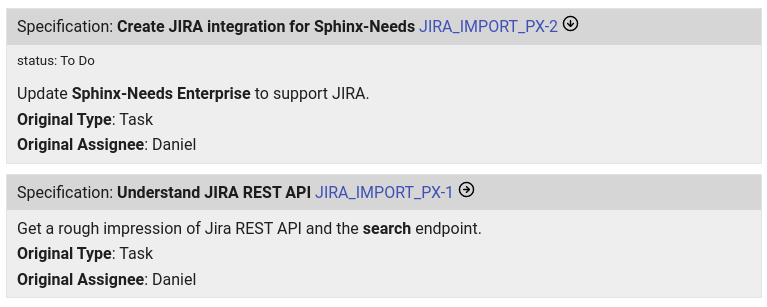JIRA ¶
The
Jira
service synchronizes
data between
Jira
from
Atlassian
and the
life cycle management extension
Sphinx-Needs
from
useblocks
.
The implementation is based on the services mechanism of Sphinx-Needs .
The
Jira
service allows to retrieve external data during documentation build and
to create Sphinx-Needs objects based on this data.
After the created Sphinx-Needs objects support every function from
Sphinx-Needs
, which includes Filtering, Linking,
Updating and much more.
Options ¶
The following options can be used inside
..
needservice::
Jira
and related directives.
query ¶
A query string, which must be valid to JQL .
prefix ¶
A string, which is taken as prefix for the need-id. E.g.
CB_IMPORT_
–>
CB_IMPORT_005
.
Config ¶
Most configuration needs to be done via the service configuration in your
conf.py
file.
Hint
For details about most configuration options, please take a look into the common configuration description .
The following documentation describes service specific information for
Jira
only.
endpoint ¶
Default
:
/rest/api/2/search
See also endpoint for more details.
query ¶
String, which must follow the JQL . notation.
See also query for more details.
id_prefix ¶
A prefix for the final ID of the created need. Can get important, if the IDs from Jira are not unique.
Example:
JIRA_
will create IDs like
JIRA_TEST-3
.
convert_content ¶
If True, the format used by JIRA for descriptions gets transformed to rst. This allows Sphinx to render the content.
Otherwise the default format is kept and printed, which would contain also the style
specific information like
h3.
for titles.
Drawback: The used converter libraries are quite slow and it will take 1-3 seconds per issue.
Default : True
Example ¶
Inside your
conf.py
file:
jira_content = """
{{data.fields.description}}"""
needs_services = {
"jira_config": {
"url": "http://127.0.0.1:8081",
"user": "test",
"password": "test",
"id_prefix": "JIRA_",
"query": "project = PX",
"content": jira_content,
"mappings": {
"id": ["key"],
"type": "spec",
"title": ["fields", "summary"],
"status": ["fields", "status", "name"],
},
"extra_data": {
"Original Type": ["fields", "issuetype", "name"],
"Original Assignee": ["fields", "assignee", "displayName"],
},
},
}
Inside any
rst
file of your Sphinx project:
.. needservice:: jira_config
:query: project = PX
:prefix: JIRA_IMPORT
.. needtable::
:filter: "JIRA_IMPORT" in id
Result

